|
|
|
Sort Order |
|
|
|
Items / Page
|
|
|
|
|
|
|
| Srl | Item |
| 1 |
ID:
095352


|
|
|
|
|
| Publication |
2009.
|
| Summary/Abstract |
Scholars and the international media often allude to a putative "African view" of Africa-China links, constructed from anecdotal evidence. Using random sample and university-based surveys, we elaborate the first empirically based study of what Africans think of their relationships with China. We reach three conclusions. First, African views are not nearly as negative as Western media make out, but are variegated and complex. Second, the survey results are at variance with the dominant Western media representation that only African ruling elites are positive about these links. Third, we find that the dominant variation in African perspectives is by country, compared with variations such as age, education and gender. The differences among countries in attitudes towards China are primarily a function of the extent to which national politicians have elected to raise the "Chinese problem" and, secondarily, the extent of Western media influence in African states.
|
|
|
|
|
|
|
|
|
|
|
|
|
|
|
|
| 2 |
ID:
134615
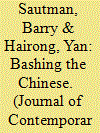

|
|
|
|
|
| Summary/Abstract |
The 2010 shooting of 13 miners at Zambia's small, privately-owned ‘Chinese’ Collum Coal Mine (CCM) has been represented by Western and Zambian politicians and media as exemplifying the ‘neo-colonial’ and ‘amoral’ practices of ‘China’ and ‘the Chinese’ in Africa. CCM has been used to provide a sharp contrast to the supposed ways of the Western firms that own most of Zambia's mines. Embedded in racial hierarchy and notions of strategic competition between the West and China, the discourse of the CCM shootings further shapes conceptions of global China and Chinese overseas. While examining all the oppressive conditions that have given rise to protest at the mine, we contextualize the shooting and subsequent conflicts. In analyzing CCM's marginal and troubled development, we discuss aspects of the 2010 shooting incident known to miners and union leaders, but ignored by politicians and media. We look at the shooting's political fallout, focus also on the epilogue that was the 2012 CCM riot—in which one Chinese person was murdered and several others seriously injured—and trace the sometimes violent discontent manifested at other foreign-owned mines in Zambia since their privatization in the late 1990s. The empirical data for this detailed study derive from hundreds of documentary sources and interviews with union leaders, workers, officials and others in Zambia from 2011 to 2013.
|
|
|
|
|
|
|
|
|
|
|
|
|
|
|
|
| 3 |
ID:
114858


|
|
|
|
|
| Publication |
2012.
|
| Summary/Abstract |
A recent addition to the global discourse of China's interaction with developing countries has been the claim that the Chinese government exports prison labour to these countries. While no evidence is ever presented to support this claim, it has been widely circulated in international and local media, as well as on the internet. This article examines the origins of the rumour and the mechanisms of its transmission. It shows that while the rumour often originates at the grass roots in developing countries, it is promoted locally and globally by political, economic and media elites with distinct agendas that often involve building support for opposition parties, competition in obtaining contracts, or geo-strategic and ideological rivalry. We analyse the rumour's circulation in light of the larger discourse on China and developing countries, and discuss why Chinese official responses to the claim have proved to be ineffective.
|
|
|
|
|
|
|
|
|
|
|
|
|
|
|
|
| 4 |
ID:
183195
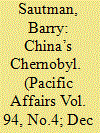

|
|
|
|
|
| Summary/Abstract |
In COVID-19’s first months, US politicians and media forecast that a contrast between Chinese deception and incapability and Western success against the pandemic might fatally sink internal confidence in China’s party-state. It would also diminish China externally, as it came to be seen as endangering the world by spreading biological pollution. A “China’s Chernobyl” prediction became the latest “China collapse” wish-fulfilment. This rests on two contradictory yet co-existing Yellow Peril tropes: “deceit and incompetence” and “world domination.” However, no empirical basis exists for either notion: China prevailed against the pandemic and lacks the capacity for global hegemony. “China’s Chernobyl” is most relevant then as a wish that creates a belief, that China should and could collapse. That in turn bolsters the US-led mobilization to counter China as a “strong competitor” and frames China as the common enemy, thereby promoting Western transnational and US internal cohesion.
|
|
|
|
|
|
|
|
|
|
|
|
|
|
|
|
| 5 |
ID:
166618
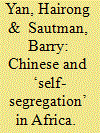

|
|
|
|
|
| Summary/Abstract |
Chinese are often said to ‘self-segregate’ in Africa. Chinese ethnocentricity is typically offered as an explanation for the putative non-interaction. Meanwhile Chinese are not compared to other non-indigenous people in Africa, implying unique Chinese self-isolation. Due to China’s semi-peripheral dynamics however, the contemporary Chinese presence in Africa cannot be generalized into a single category. Based on surveys, interviews, and documents, we examine the varied presence of Chinese in Africa, including residential patterns acquisition of local African languages, and socialization patterns, and draw distinctions between Chinese expatriates and Chinese migrants. Factors affecting Chinese adaptation include local political environment, recentness of migration, language barriers, and corporate policies to mitigate crime and conflict. We argue that most Chinese in Africa are not self-isolated and not more isolated in Africa than are other Asian migrants and whites there. Claims of Chinese self-isolation reflect a longstanding, global Yellow Peril discourse that persists despite discrediting evidence.
|
|
|
|
|
|
|
|
|
|
|
|
|
|
|
|
| 6 |
ID:
074358


|
|
|
|
|
| Publication |
2006.
|
| Summary/Abstract |
A central element of the narrative circulated by the Tibet Movement has been that China has carried out genocide and practised colonialism in Tibet. These notions are, for the most part, uncritically accepted by politicians and the media, especially in the West. This essay challenges such characterizations as inept and as obstacles to resolving the Tibet Question. It looks at whether convincing empirical evidence of physical and cultural genocide in Tibet exists, in light of the most common understanding of such practices as rooted in efforts to destroy a people and its culture. The essay also considers what the contours of colonialism have been in light of its principal modern experience, that of European, US and Japanese colonization, and determines whether the Tibet case fits these characteristics. The essay concludes that a critique of China's policies and practices in Tibet would be best served by focusing on actual problems experienced by Tibetans.
|
|
|
|
|
|
|
|
|
|
|
|
|
|
|
|
| 7 |
ID:
068084
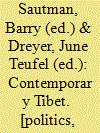

|
|
|
|
|
| Publication |
Armonk, M E Sharp, 2006.
|
| Description |
vii, 360p.hbk
|
| Standard Number |
0765613549
|
|
|
|
|
|
|
|
|
|
|
|
Copies: C:1/I:0,R:0,Q:0
Circulation
| Accession# | Call# | Current Location | Status | Policy | Location |
| 050948 | 951.506/SAU 050948 | Main | On Shelf | General | |
|
|
|
|
| 8 |
ID:
081824


|
|
|
| 9 |
ID:
073846
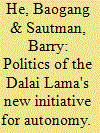

|
|
|
|
|
| Publication |
2005.
|
| Summary/Abstract |
In the late 1980s, the Dalai Lama first asserted that he was willing to no longer press for an independent Tibet. Until recently, however, scant progress was made toward negotiations between the Tibetan exiles and the government of the People's Republic of China: the PRC had shown no inclination to negotiate about matters beyond the Dalai Lama's own status, while the exiles had insisted that China renounce all control over affairs in Tibet, except foreign affairs and defense. In 2002, largely in response to external pressures, China invited one of the Dalai Lama's brothers to visit Tibet and in 2002-2005 the Dalai Lama's representatives have visited Tibetan areas of China on three occasions and, most recently, have met with PRC representatives in Switzerland. The Dalai Lama has since gone some way toward accommodating PRC pre-conditions for negotiations. He has acknowledged that Tibet is part of China and Tibetan culture part of Chinese culture, as well as refocusing his concerns away from political demands to questions of cultural and religious autonomy. Formidable obstacles to negotiations remain, including exile demands that they be about unification of all PRC Tibetan areas and the establishment of liberal democracy in Tibet. Compromise solutions are available, however, and China can take a number of steps that would facilitate acceptance of compromise in the exile community and that would substantially benefit Tibetans in Tibet.
|
|
|
|
|
|
|
|
|
|
|
|
|
|
|
|
| 10 |
ID:
129454
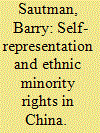

|
|
|
|
|
| Publication |
2014.
|
| Summary/Abstract |
Proposals to reform along liberal lines China's system of discrete minority rights, such as ethnic regional autonomy and preferential policies, seek to 'depoliticize' minorities by treating them as cultural groups whose members have individual, but not collective, rights. Beyond the binary of only individual rights or no change, a third option is to expand minority rights, including through their self-representation. Not self-determination, which is inapplicable to minorities, self-representation can be based on structures that allow minority people to take up their histories and cultures, ethnic disparities, and their position in China's political leadership. Organizations of self-representation need not be counterposed to the state and can address non-elite concerns in ways that promote minority participation in China's governance and minority integration, not assimilation.
|
|
|
|
|
|
|
|
|
|
|
|
|
|
|
|
|
|
|
|
|